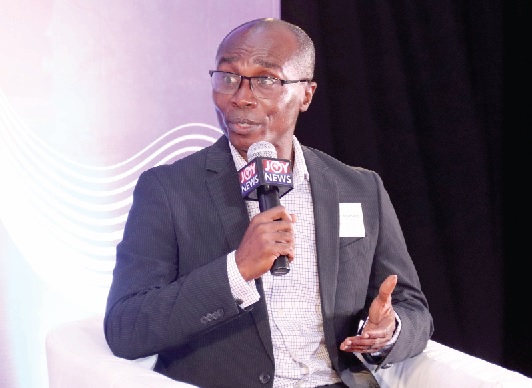
Economy not recovering yet — Economist
An Economist and lecturer at the University of Ghana, Dr Patrick Assuming, has said that Ghana’s economy is not yet in a recovery mode, contrary to government’s position that the economy has turned the corner.
He said although the macro-economic environment has seen some relative stability since the second half of 2023, it was not enough to say the economy was recovering, especially when households and businesses which were affected are yet to recover.
Speaking on the Graphic Business X Dialogue series, he said “sometimes the government wants us to believe we are recovering but we are not on any recovery yet.
“We have seen some stability but the question is whether those businesses who went under and those people who lost their jobs have recovered, it is only when they do that we can say we are recovering,” he stated.
Government in July 2022 officially approached the International Monetary Fund for an extended credit facility aimed at restoring macro-economic stability and debt sustainability.
Months after implementing the IMF programme, Ghana’s economy began to see a turnaround, characterised by declining inflation, relative currency stability, improvement in fiscal space and in gross international reserves.
GDP Growth rebounded strongly averaging 3.2 per cent in the first two quarters of 2023, while inflation dropped to 23.2 per cent in December 2023, with the cedi also stabilising against the US dollar, depreciating by 6.4 per cent on cumulative basis between February and November 2023, compared to 53.9 per cent over the same period in 2022.
Inflation has also dropped from a 22-year high of 54.1 per cent in December 2022 to 23.2 per cent in December 2023.
On the fiscal front, the primary balance on commitment basis for first half of the year was a surplus of about GH¢2 billion compared to a deficit target of GH¢4 billion.
Gross International Reserves (GIR) also stood at US$2.1 billion equivalent to 1.0-month of import cover, compared with US$1.5 billion (0.6 month of import cover) recorded at the end of December 2022.
On the debt front, public debt accumulation has slowed down significantly, as government continues to consolidate its public finances, coupled with the debt restructuring exercise. Total public debt has declined from 73.1 per cent of GDP at the end of 2022 to 66.4 per cent of GDP as of September, 2023, with the completion of external debt restructuring expected to further improve Ghana’s debt situation.
The Minister of Finance, Ken Ofori-Atta, at a joint press conference by the ministry and the IMF, said the Ghanaian economy had turned the corner.
“Ultimately, we are sure in our resolve that our economy has certainly turned the corner and across the government we will focus on attaining a more resilient, transformed economy that delivers higher living standards for our people within the shortest possible time,” he stated.
Also at the press conference, the IMF Mission Chief in Ghana, Stephane Roudet, said inflation was going down rapidly, the external and fiscal position were turning around, gross international reserves were improving, which all point to some progress.
He said economic activity was performing even better than what the IMF projected which is why the IMF was revising the GDP projection upwards.
No recovery yet
Dr Assuming, however, said the fact that the government had put in place measures to improve its finances and macro economy did not in any way mean there was an economic recovery.
He noted that the measures put in place to improve the macro economy even came at the expense of households and businesses through the DDEP and the introduction of new taxes.
“So you cannot be talking about recovery because you have seen some stability in the macro-economic indicators.
“We must understand that the challenges we had in 2022 and 2023 were not just a deterioration of the macro economy, it reflected in people actually losing their jobs, reflected in stagnation of wages, and reflected in businesses shutting down,” he stated.
What 2024 will look like
Commenting on how 2024 will look like in terms of the economy, he said past challenges with the energy sector were beginning to re-emerge and that posed significant risks this year.
“This month, we have seen the problems with electricity beginning to take shape again and this is an additional source of uncertainty coming into 2024. The problem is that there is so much misinformation in an attempt to hide the truth that you really struggle to know what the real issues are,” he said.
He said with the government failing to convince the Independent Power Producers (IPPs) to participate in the debt restructuring exercise, they seemed to be carrying out their threats of cutting off supply.
Stability will be short term
Also speaking on the X Dialogue Series, Professor of Finance and Economic at the University of Ghana, Professor Godfred Bokpin, said considering happenings in the global environment, ??????the world would see stability for long.
He said countries, and for that matter Ghana, must therefore be thinking of how to build resilience amid uncertainty.
“The territory of relative certainty, predictability, we have lost that now; we are just moving from one crisis or conflict to the other and beyond missiles firing across the territories. There is also the soft beneath issues like the global geopolitics and the geo-economic fragmentation which countries will have to navigate their way through.
“If you are looking for excuses, you will find enough of them. As a country, we know to some extent these global developments will impact us but we have to build the resilience of our system to withstand the risk,” he stated.
He said a well governed country should be able to insulate its citizens from the harmful effect of developments it did not have control over.